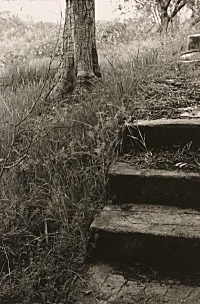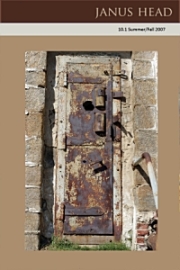|
|
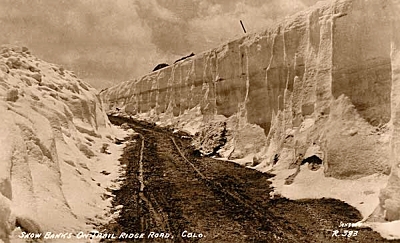 Trail Ridge Road
Rocky Mountain National Park
ca. 1940
Historic Colorado Photographs
______________________________________
eXchanges: winter 2008
via Three Percent
from
The Wet Streets
Miklavž Komelj
translated by Dan Rosenberg & Boris Gregoric
Like someone who has suffered a great loss –
and people, in rituals,
so serene – and terrible – and hidden,
that direct exposure brings
some distance, some relief.
Which generates
those rituals constantly.
The haste and shudder, the concealing
of what is being revealed
with what is being revealed.
And tearing a mask from a face
is one of the predictable
gestures when handling a mask. ... (more)
______________________________________
Sidelined
Elfriede Jelinek
Nobel Lecture
December 7, 2004
Translation from German by Martin Chalmers
Is writing the gift of curling up, of curling up with reality? One would so love to curl up, of course, but what happens to me then? What happens to those, who don’t really know reality at all? It’s so very dishevelled. No comb, that could smooth it down. The writers run through it and despairingly gather together their hair into a style, which promptly haunts them at night. Something’s wrong with the way one looks. The beautifully piled up hair can be chased out of its home of dreams again, but can anyway no longer be tamed. Or hangs limp once more, a veil before a face, no sooner than it could finally be subdued. Or stands involuntarily on end in horror at what is constantly happening. It simply won’t be tidied up. It doesn’t want to. No matter how often one runs the comb with the couple of broken off teeth through it - it just doesn’t. Something is even less right than before. The writing, that deals with what happens, runs through one’s fingers like the time, and not only the time, during which it was written, during which life stopped. No one has missed anything, if life stopped. Not the one living and not dead time, and the one who is dead not at all. When one was still writing, time found its way into the work of other writers. Since it is time, it can do everything at once: find its way into one’s own work and simultaneously into the work of others, blow into the tousled hairstyles of others like a fresh, even if malign wind, which has risen suddenly and unexpectedly from the direction of reality. Once something has risen, then perhaps it doesn’t lie down again so quickly. The angry wind blows and sweeps everything with it. And it sweeps everything away, no matter where, but never back to this reality, which is supposed to be represented. Everywhere, except there. Reality is what gets under the hair, under the skirts and just that: sweeps them away and into something else. How can the writer know reality, if it is that which gets into him and sweeps him away, forever onto the sidelines. From there, on the one hand, he can see better, on the other he himself cannot remain on the way of reality. There is no place for him there. His place is always outside. Only what he says from the outside can be taken up inside, and that because he speaks ambiguities. And then there are already two who fit, two whose faces are right, who warn, that nothing is happening, two who construe it in different directions, reach out to the inadequate grounds, which have long ago broken off like the fangs of the comb. Either or. True or false. It had to happen sooner or later, since the ground as building ground was quite inadequate. And how could one build on a bottomless pit anyway? But the inadequacy that enters the writers’ field of vision, is still adequate enough for something, that they could also take or leave. They could take or leave it, and they do leave it. They don’t kill it. They merely look at it with their bleary eyes, but it does not become arbitrary because of this bleary gaze. The gaze is well aimed. Whatever is struck by this gaze says, even as it sinks down, although it has hardly been looked at, although it has not even been exposed to the sharp gaze of the public, whatever has been struck never says, that it could also have been something else, before it fell victim to this one description. It says exactly what had been better left unsaid (because it could have been better said?), what always had to remain unclear and groundless. Too many have already sunk into it up to their stomachs. It’s quicksand, but it doesn’t quicken anything. It is groundless, but not without grounds. It is as you like, but it is not liked.... (more)
An Introduction to the Work of Elfriede Jelinek
Andrea Bandhaue Comparative Literature and Culture
______________________________________
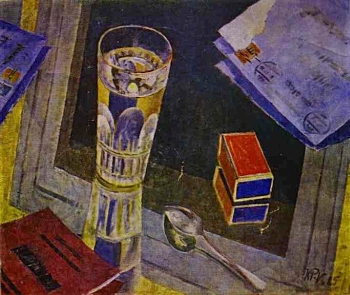 Still Life with Letters
Kuzma Petrov-Vodkin
1878-1939 ______________________________________
Cinema 1 - The Movement-Image
Cinema 2 - The Time-Image
Giles Deleuze
download link
Difference and Repetition
Gilles Deleuze
Paul Patton (Translator)
Anti-Oedipus: Capitalism and Schizophrenia
Gilles Deleuze & Felix Guattari ______________________________________
I’ve come to the conjunction of the wheel
where the horizon as the sun goes down
gives birth for us to the twin-governed sky,
and Love’s own star is distant from us all
because of the bright ray that crosses it
in such a way that it becomes a veil.
The planet that brings solace to the frost
fully to us through the great arch appears
wherein the Seven a small shadow cast;
and yet not even one
of all the thoughts of love that on me weigh
relieves my mind, now harder than a stone
in strongly storing images of stone.
Lyric Poems
Dante
Translation by Joseph Tusiani
______________________________________
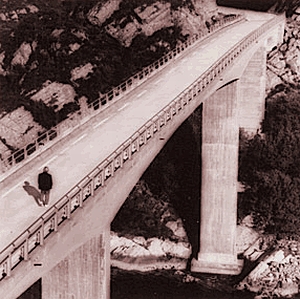 Oyvind Hjelmen
______________________________________
Selected Minor Works:
Historical Reflections on Language and Bipedalism
Justin Erik Halldór Smith
3quarksdaily
Language and bipedalism have long served as the most promising criteria for marking out human distinctness among natural beings. It is noteworthy that in antiquity 'featherless biped', while tongue-in-cheek, was as a definition of 'man' the only available alternative to 'rational animal'. In the 17th century some, such as the philosopher Margaret Cavendish, explicitly identified language as dependent upon upright posture, while the anatomist Edward Tyson had to devote almost as much energy to arguing that chimpanzees can walk on their hind legs as to arguing that they cannot speak. Both doctrines reveal an incipient atheism and materialism, and Tyson was not radical enough to accept them both. (...)
If we wish to continue jealously guarding language as something uniquely our own, and to inflate it into some quasi-divine human virtue, we should ask ourselves whether this is any less small-minded than the ongoing effort, Craig Stanford its latest spokesman, to do something similar with bipedalism-- an impressive skill, to be sure, but far from godly. It is amazing to me that old pieties about the special place of humans in the cosmos can still sell books, even when the case can no longer be made on the basis of profound, theologically based convictions, and must instead rest on trivial features of our species such as gait and call. I suspect that there's some kind of dim self-congratulatory buzz coursing through electric eels too, some faint self-love rooted in the singularity of this species' special adaptive trait, which, unlike language and bipedalism, really is a rarity in nature.... (more)
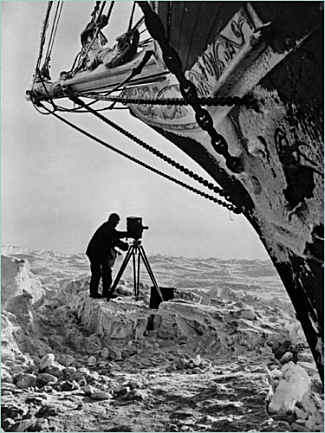 Endurance Expedition Images
Frank Hurley
1885-1962
Hurley negative collection
natiional library of australia
10,999 glass negatives, plastic negatives, col. transparencies,
lantern slides, and stereographs
______________________________________
The one thing worse than being lost in translation is being lost to translation.
Found in TranslationForrest Gander
poet and translator Forrest Gander 's presentation at 'The Power and Politics of Translation,' a panel discussion at the recent AWP (2/2/08 in NYC). Green Hill
As a translator myself, I approach the self-obliterating work with trepidation. All the more so because my own language rides a history of military and economic conquests that have deprived other cultures of their indigenous languages.
I may hope my own translations are less colonial raids than subversions of English, injections of new poetic forms, ideas, images, and rhythms into the muscular arm of the language of power, but I know they are both.
Nevertheless, I'd suggest that translations undercut the presumed self-sufficiency, and the nationalism and jingoism it can encourage, of a native tongue. When we recognize that there's no literary absolute, no language that is not an approximation limited by cultural restraints, we know for sure that ours is only one language among others. The ethical gesture of inviting the word of the other into our own understanding is the most elemental precondition for communication between individuals.... (more)
______________________________________
The Ear of the Other: Otobiography, Transference, Translation
Jacques Derrida
translated by Peggy Kamuf and Avital Ronell
______________________________________
Translation Studies and Agamben's Theory of the Potential
Paolo Bartoloni
Interpreting Aristotle's Book Theta of the Metaphysics, the Italian philosopher Giorgio Agamben remarks that "in its originary structure, dynamis, potentiality, maintains itself in relation to its own privation, its own steresis, its own non-Being. This relation constitutes the essence of potentiality. To be potential means: to be one's own lack, to be in relation to one's own incapacity. Beings that exist in the mode of potentiality are capable of their own impotentiality; and only in this way do they become potential. They can be because they are in relation to their own non-Being. In potentiality, sensation is in relation to anesthesia, knowledge to ignorance, vision to darkness" (1999a, 182). Truth to untruth, we could add, originality and uniqueness to non-originality and translation. This understanding and articulation of "potentiality" has enabled Agamben to enter a sustained reappraisal of knowledge, selfhood, language, and narrative in books such as Potentialities (1999a), The End of the Poem (1999b), and The Coming Community (1993). Agamben has not written directly or specifically about translation, yet his philosophical discourse and his implicit and explicit dialogue with Aristotle, Benjamin, Blanchot, Deleuze, Heidegger, and Levinas, amongst others, is, as I see it, of particular importance for a review of translation theory at a time when the traditional juxtaposition of original and translation and its attendant comparative theoretical framework appear increasingly limiting and inadequate to explain current phenomena of cross-cultural encounters and exchange.... (more)
Comparative Literature and Culture______________________________________
 yucca moon
Paul Kozal
______________________________________
Draft 73: Vertigo
Rachel Blau DuPlessis
Viva, fidgeting roses!
Do men interrupt them
vexing blank calyxes to prompt them?
Vote volta-face for diagnosis.
“Already with thee” vs.
alterity of thee—it’s heady.
Are you Ready; are you composed?
Can you go a third vertiginous road?
Light comes thru the letter.
That’s what one awaits.
An alphabetic knock “oe vert”
at the folded gates.
Sirenic joy! the site erupts—to pour
its cockamamie allure
on the fragrant cipher
exfoliating separate, e-quill plunder. ... (more)
______________________________________
Atlantic Online
TheAtlantic.com is dropping its subscriber registration requirement and making the site free to all visitors.
Now, in addition to such offerings as blogs, author dispatches, slideshows, interviews, and videos, readers can also browse issues going back to 1995, along with hundreds of articles dating as far back as 1857, the year The Atlantic was founded.
______________________________________
More full text downloads from Farkyarlari
Philosophical Investigations/Philosophische Untersuchungen
Ludwig Wittgenstein
G. E. M. Anscombe (Translator)
Wittgenstein on Rules and Private Language
An Elementary Exposition
Saul A. Kripke
Signeponge=Signsponge
Jacques Derrida
translated by Richard Rand
Of Grammatology
Jacques Derrida
translated by Gayatri Chakravorty Spivak
______________________________________
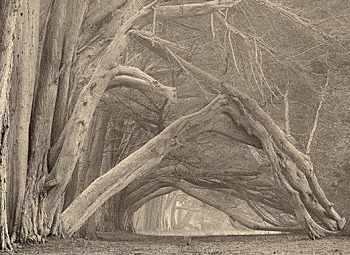 Hedgegate
Paul Kozal 1 2 3 4
______________________________________
The Life Of Reason
The Phases of Human Progress
Volumes One Through Five
George Santayana
project gutenberg
The division of labour when extreme does violence to natural genius and obliterates natural distinctions in capacity. What is properly called industry is not art or self-justifying activity, but on the contrary a distinctly compulsory and merely instrumental labour, which if justified at all must be justified by some ulterior advantage which it secures. In regard to such instrumental activities the question is always pertinent whether they do not produce more than is useful, or prevent the existence of something that is intrinsically good.
Occidental society has evidently run in this direction into great abuses, complicating life prodigiously without ennobling the mind. It has put into rich men's hands facilities and luxuries which they trifle with without achieving any dignity or true magnificence in living, while the poor, if physically more comfortable than formerly, are not meantime notably wiser or merrier. Ideal distinction has been sacrificed in the best men, to add material comforts to the worst. Things, as Emerson said, are in the saddle and ride mankind. The means crowd out the ends and civilisation reverts, when it least thinks it, to barbarism....... (more) ______________________________________
... like the air we breathe, many of us take for granted that a corporate press is a free press; that we are a basically compassionate society pursuing rational, humane policies; that profit maximisation leading to economic growth is the proper, rational goal of society; that success and happiness are best defined in terms of high status conformist production and high status conformist consumption. Crucially, we also tend to assume that we freely choose these beliefs and goals, that our consent is volunteered, not manufactured. Psychologist Erich Fromm described the reality:
"From the fight against the authority of Church, state, and family which characterise the last centuries, we have come back full circle to a new obedience; but this obedience is not one to aristocratic persons, but to the organisation. The 'organisation man' is not aware that he obeys, he believes that he only conforms with what is rational and practical." (Fromm, Beyond The Chains Of Illusion, Abacus, 1989, pp.157-158)
Media Lens, Propaganda, Power, And Moral Truisms
______________________________________
Supermarkets This Large
David Hernandez
in the last row in the furthest aisle. I’m feverish
with colored spots fireworking in my periphery.
I hear someone say, Here we don’t die, we shop.
I hear someone reply, Once we stop denying death,
everything tastes better. Meanwhile, a forklift
beeps as it lowers crates of strawberries, hundreds
huddled between the wooden slats. Little hearts.
Hungry tongues. It depends who you believe. ... (more)
______________________________________
Draft L: Scholia and Restlessness
Rachel Blau DuPlessis
One has touched vers, toward what objection hardy knows,
Touched glass, meddled the poem, cracked crystal show-
shelves in the thrift stores, smashed debris again, gained in
intensity, yet blocked comment! Reined in.
Stand there, restlessness. Also femaleness, heightened by
another hot flash, time, loss, annoyance, frankly
can't sit still, flesh floods the place as loose as
sloggy water, sandy brookings where one tides a bay,
"surfant le web" or "parling anguish." Where
beach-rose berries globen orange ripe, Here,
is this Happening? alongside what text, in what cued
brain extt, or xtte? The lemma-afloat with breathing tube
wiggles through rushing fish wash, blue schools they were
running light tween, twist unseen from wavers of a placid sea,
breath deliberate in the mouth and loud, husky heaves
of own survival. El allows for depth just under the surface
between subaqueous seam and down-- "that zone"
"that parallel world we live in whenever we waken to it."
... (more)
Rachel Blau DuPlessis
Electronic Poetry Center ______________________________________
 Happy Birthday Mother
photo - mw
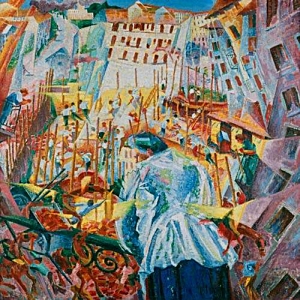 The Street Enters The House,
Umberto Boccioni
1911
______________________________________
City of Sound: The Street as Platform
Dan Hill
We can't see how the street is immersed in a twitching, pulsing cloud of data. This is over and above the well-established electromagnetic radiation, crackles of static, radio waves conveying radio and television broadcasts in digital and analogue forms, police voice traffic. This is a new kind of data, collective and individual, aggregated and discrete, open and closed, constantly logging impossibly detailed patterns of behaviour. The behaviour of the street.... (more)
A fine essay.
Thanks to Anne Galloway at Space & Culture City of Sound
______________________________________
The Sandhill Interviews
resurrected at Frank Paynter's Listics
including the classic five part interview with Mike Golby
______________________________________
"To play the card of abstraction, and the aporia of the no-way-out, perhaps one must first withdraw to a desert, or even to isolate oneself on an island. And tell a short story that would not be a myth."
- Derrida from a passage in "Faith and Knowledge: The Two Sources of 'Religion' at the Limits of Reason Alone" posted at pas au-del?
______________________________________
Back-chat, Funny Cracks
The novels of Flann O'Brien
John Updike
The man was ingenious and learned like Jim Joyce and like Sam Beckett gave the reader a sweet dose of hopelessness but unlike either of these worthies did not arrive at what we might call artistic resolution. His novels begin with a swoop and a song but end in an uncomfortable murk and with an air of impatience. ______________________________________
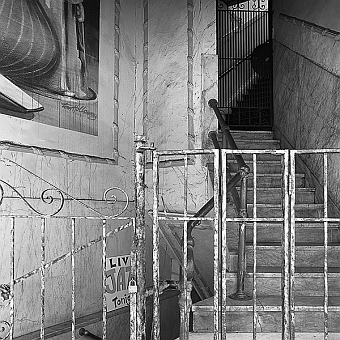 George LeChat part of his Gray City* project
______________________________________
Violence and history
Gérard Wormser
Translation by Mike Routledge
eurozine
... the singularizing nature of history is what distinguishes it from all the social sciences that claim to identify laws, constants, and invariables. It is in terms of singularity that history confers meaning and not in terms of any hypothetical system of laws that it might claim to be able to establish. We must therefore arm ourselves against the spectre of false generalization that leads to a terrible euphemizing of violence. If violence were to be considered as a set of typical cases that could be grouped together in reference to laws, constants or statistics, then the violent aspect of violence would be denied. It would simply be seen as a social norm that negates its nature as an intentional act that is suffered or committed. The question of the meaning of violence necessarily refers to an intentional dimension, which cannot be accounted for within a statistical framework or be the subject of some analogy or search for recurrence. Correctly viewed, all violence is unique and singular.... (more)
.....................................................................
Critique of Violence Walter Benjamin download link
Long Sunday Symposium on Walter Benjamin's "Critique of Violence"
______________________________________
An End Foreseen
Uri Avnery looks at William Polk's Violent Politics
Every insurgency is, of course, unique and different from all others, because the backgrounds are different, as are the cultures of the occupied peoples and the occupiers. The British differ from the Dutch, and both from the French. George Washington was different from Tito, and Ho Chi Minh from Yasser Arafat. Yet in spite of this, there is an amazing similarity between all the liberation struggles.(...)
... an insurgency supported by the public is bound to win, irrespective of the tactics adopted by the occupation regime. The occupier can kill indiscriminately or adopt more humane methods, torture captured freedom fighters to death or treat them as prisoners of war – nothing makes a difference in the long run. The last of the occupiers can board a ship in a solemn ceremony, like the British high commissioner in Haifa, or fight for a place in the last helicopter, like the last American soldiers on the roof of the American embassy in Saigon – defeat was certain from the moment the insurgency had reached a certain point.
The real war against the occupation takes place in the minds of the occupied population. ... (more)via Qlipoth
______________________________________
 Staircase connecting St. Piat's Chapel to Cathedral
Date: c 1324
Chartres: Cathedral of Notre-Dame
extensive image collection
large scans
hosted by the University of Pittsburgh's Digital Research Library
______________________________________
Walter Benjamin, Primo Levi, Paul Celan committed suicide; De Man and Heidegger went on to prosper. What did the former know that the latter never absorbed? To acknowledge the Second War means to risk suicide and in the process to politicize philosophy; and if we desire to avoid death and evade politics, repression is inevitable.
Charles Bernstein, The Second War And Postmodern Memory
______________________________________
Mythbusting Canadian Healthcare, Part II:
Debunking the Free Marketeers
Sara Robinson
In the previous post, I looked at ten of the most common myths that get bandied about whenever Americans drag Canada into their ongoing discussions about healthcare. In this follow-up, I'd like to address a few of the larger assumptions that Americans make about health care that are contradicted by the Canadian example; and in the process offer some more general thinking (and perhaps talking) points that may be useful in the debates ahead.... (more)
 Czech Eden
Matthew Monteith via Mrs. Deane
______________________________________
from
Poetry Criticism [PDF]
Eileen Tabios
critiphoria
--for Paul Auster, and after his Collected Poems
What if
all along
the interior was stone?
All along
what if
stone defined the absence of void?
______________________________________
The poverty of nations
Jeremy Seabrook
The most privileged people on earth dwell upon the coveted goods, sensations and experiences from which the slenderness of their means estranges them. Why has the wealth of the rich world set up such an unassuagable obsession with what remains always just out of reach? How does our plenty produce such a feeling of penury, our prosperity of deprivation?(...)
What are the insistent fangs of insufficiency that gnaw at the heart and psyche of everyone in the rich world, if not the internalised mechanisms of the need for perpetual economic growth? Human need and economic necessity have changed places, so that no one can say with any certainty where the circulation of the blood ceases and the cashflow begins, whether the rhythms of the heart mimic moments of boom and bust, or how the rise and fall of our life's breath follows the seasons of production and consumption. Our version of "human nature" is a very particular one, for it demands conformity with the nature of capitalism.(...)
"The poor you shall have with ye always" used to be regarded as a sorrowing biblical comment on the natural state of things. Whether or not it ever was "natural", it has certainly been brought to a high art by human contriving; so much so that we have, through the mysterious alchemy of wealth, all become poor; a poverty destined to remain forever incurable, since it is inseparable from the peculiar dogmas of wealth-creationism; a faith from which few people in the world now dissent.... (more)via
______________________________________
How did populism ever become the native tongue of the wealthy?
The Rise of Market Populism America's New Secular Religion Thomas Frank
Market populism can seem quite absurd at times. We are, after all, living through one of the least populist economic eras in the past hundred years. The "New Economy" has exalted the rich and forgotten about the rest with a decisiveness that we haven't seen since the twenties. Its greatest achievement-- the booming stock market of recent years--has been based in no small part on companies' enhanced abilities to keep wages low even while CEO compensation soars to record levels. Market populism is, in many ways, the most blatant apologia for economic inequality since social Darwinism. But there can be no doubting the intensity of the true believers' faith.... (more)
______________________________________
Waterboarding for God and Country
Ray McGovern
I missed the National Prayer Breakfast—for the 45th time in a row. But, as I drove to work I listened with rapt attention as President George W. Bush gave his insights on prayer:
“When we lift our hearts to God, we’re all equal in his sight. We’re all equally precious...In prayer we grow in mercy and compassion.... When we answer God’s call to love a neighbor as ourselves, we enter into a deeper friendship with our fellow man — and a deeper relationship with our eternal Father.”
(...)
Sometimes it takes a truth-telling outsider to throw light on our moral failures.
South African Methodist Bishop Peter Storey, erstwhile chaplain to Nelson Madela in prison and longtime outspoken opponent of apartheid, has this to say to those clergy who might be moved to preach more than platitudes:
“We had obvious evils to engage; you have to unwrap your culture from years of red, white, and blue myth. You have to expose and confront the great disconnect between the kindness, compassion, and caring of most American people and the ruthless way American power is experienced, directly or indirectly, by the poor of the earth. You have to help good people see how they have let their institutions do their sinning for them.
“All around the world there are those who long to see your human goodness translated into a different, more compassionate way of relating with the rest of this bleeding planet.”
... (more)
______________________________________
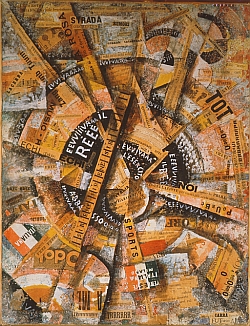 Interventionist Demonstration
1914
Carlo Carr?
February 11, 1881—April 13, 1966
International Museum of Collage, Assemblage and Construction
______________________________________
Text Loses Time
Nico Vassilakis
Crag Hill's Manypenny Press
Lulu
Author’s statement:
This book intends to present both verbal and visual poetries as equal. Though notions of poetics have shifted and swerved, what has stayed solid throughout is that the alphabet, the word – however arranged – contains, within it, dual significance. First, the proto-historic role of the visual conveyance of represented fact. Second, the overriding desire of human utterance to substantiate existence. In conjoining these two models this book hopes to form a third, blurred value. Thought and experience are factors that accrue, while staring and writing help resolve and conclude. Text itself is an amalgam of units of meaning. As you stare at text you notice the visual aspects of letters. As one stares further, meaning loses its hierarchy and words discorporate and the alphabet itself begins to surface. Shapes, spatial relations and visual associations emerge as one delves further. Alphabetic bits or parts or snippets of letters can create an added visual vocabulary amidst the very text one is reading. One aim, to this end, is to merge and hinge visual and textual writing into workable forms. This book collects some of these experiments.
Text Loses Time: A 1st Note
Tom Beckett .....................................................................
The Shape Of Thoughts To Come [PDF]
afterword by Nick Piombino to Nico Vassilakis' Text Loses Time (ManyPenny Press) critiphoria
Just as Louis Zukofky's maxim "lower limit speech, upper limit music" reconceived the boundaries of poetry for an era of poets in search of tools for linguistic abstraction and lyrical condensation, an analogous aphorism like "lower limit textual, upper limit visual" might be offered to account for some of today's poets emboldened, rather than dismayed, by the possibilities for technical reproducibility, some working within a terrain that has, somewhat awkwardly, been dubbed "vispo". As Bob Cobbing and Peter Mayer showed in their 1978 classic Concerning Concrete Poetry the beginning of visual poetry might be dated to the Phaistos disc of the 3rd to Mid 2cd Millennium.
Time Undisturbed: A Quick Interview with Nico Vassilakis Nick Piombino
Staring changes content as we think meaning is permanent. Meaning loses value, clarity, importance, its ability to generate income. Staring changes a word irrevocably, but only once and in one way only.(...)
Squeeze more breath out a sentence and press Ashbery’s margin return key.
Writing from back to front, from last to first, from then to now. After an allotment of time starts the culling & gleaning of texts. Longhand into tiny notebooks I carry for months. Preferring to wait, to ripen chemically. I don’t wipe down the walls to make room for more words. Approaching it as needed. A late bloomer, not till 15 yrs old did it happen that I heard voice in my head. Previous, my thoughts were in a flowing visual continuum. So writing was to document my own new sound.
The twang of inebriate accuracy. The carousel dizzy plummet devises entry. Where you want to be. Delete the bullshit to point at what remains. When is truth a mule, when is truth a chaos you carry, when is truth an obsession you wear.... (more)
Nico Vassilakis: Poetry You've Got To See
Crag Hill ______________________________________
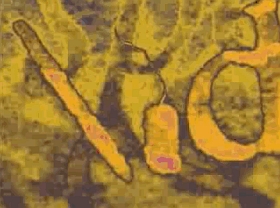 in other words, you see Nico Vassilakis - Visual Poetry
26 videos on youtube
______________________________________
[Out of Inventiveness—Looking]
Lisa Lubasch
out of inventiveness—looking—the clock has strayed—abandonment—bleached as day, its underside—where the fact is suffocated—submerged—defended from moral obligation—all accessories fading—in rushed revisions—light is tracing—scripting—lies are fancied—beneath awnings—and become relentless—indefatigable chords—trimmed from mouths—or lines of entries—the vision is fallible—tearing—is likened to idling—on the river—over woods, abundantly—a slippery concern—is riled—to contain abandonment—shifting—out of consonance—and anemic—in its fathering—thrown out with the trees—and the gusts—a redundant longing—in decline—all projects growing dim—hard to return to—but trying—deceptive in their celibacy—deliberate, narrowed—out of all approval—in memory—demanding—whimpering—to unearth the splendor—of the path—conceptual or curdled—I—right there in the month—leaves are showing—their triumphant signals—luminous scatter—unaware—of other diverse events—their meager capacity—for astonishment—barren ideas—loosing themselves from—legitimate reception—and so content to stutter vaguely—inside a meaningless hour—of lapsing—and converging—the day beside us—shading—in the course of its contention—which has withered—which has turned
.....................................................................
To Tell the Lamp
Lisa Lubasch reviewed by Chris Pusateri jacket
some more poems - 1 2 3 Twenty-One After Days
Lisa Lubasch
reviewed by Amanda Nadelberg and Lauren Levin ______________________________________
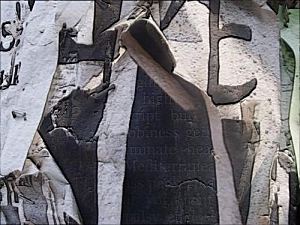 telephone poles
Jim Leftwich’s Flickr archive textimagepoem
Jim Leftwich
______________________________________
Certain Hazards of Living Without the Assumption of Timing
Lisa Lubasch
Conjunctions
Tall words wring hands, though not effortlessly
The music of cinema, the music of trees
Even in times of ease, the effort is more
Taking a walk sometimes involves the perforation of crisis
Estrangement is a thing we can feel but not always practice
Step backwards if you want to hear the cinereous sounds of living
How one can involve oneself in the world without letting go of the crisis
The arrow produces a sound like an accompaniment
But only when held in water
Even when the edges are rippled, a sight like a sound uncovers itself
We could make a deadline for ourselves and be sure to be firm about it
Not knowing the solution to the problem lends heat to the crisis
Before saying this the sentence splits off
Tearing up these documents for good represents a willingness to let go of the
crisis
Living life like that incarcerates our hearing but also our desire for
building
Honestly sounds like that produce waterfalls of ballads
Spitting ourselves out we walk up and down the metropolis
States of imagining refer us back to the summits of sleeping
Holding our heads in the vacuous sky we believe ourselves to be giants
What the informant gives us are listings
Listings keep us hoping for the cinereous task of living
Beautiful limits invest us with the quality of being half-torn
What presumptions there are about us concern the matter of our ending
Ending and living are two similar and not incompatible functions
Sending is also a way to subsist in a time of crisis. ... (more)
______________________________________
Poetry Interrogating Itself [PDF]
Sheila E. Murphy's The Case of the Lost Objective (Case)
reviewed byThomas Fink
critiphoria
As in late Wallace Stevens, the John Ashbery of "Self- Portrait in a Convex Mirror" and other work of the seventies and beyond, A.R. Ammons, Charles Bernstein and various other "Language" poets, and David Shapiro, Murphy writes poetry that has much to say about itself and about general attempts to represent individual or collective experience or culture in language. .....................................................................
Critiphoria
This journal was made for firefox extensions like PDF Download
PDF Download relieves the pain experienced when encountering PDF files on the Web. Whenever you click on a PDF file, PDF Download lets you know before trying to open it, and then offers you choices such as downloading, opening, or converting it straight to HTML.
______________________________________
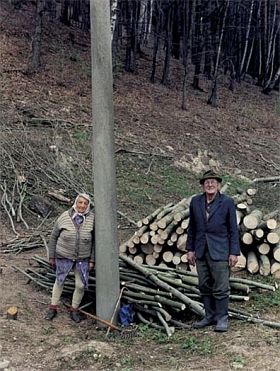 woodcutters
Matthew Monteith
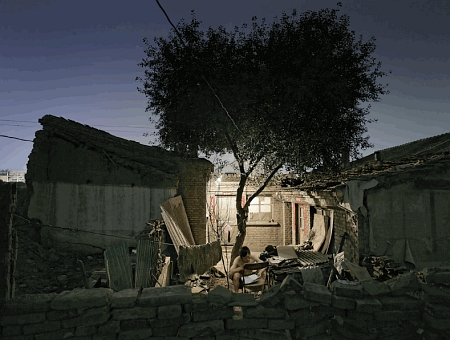 Michael Roulier
via
______________________________________
ever oh so fashionably late to the party ...wood s lot feeds powered by Page2RSS
 rss rss
 atom atom  feedburner feedburner
Thanks to Mark Thwaite (ReadySteadyBook) for the nudge.
______________________________________
Letters to the World
bpNichol’s poems celebrated the mutability of words
Jed Rasula
Who was the first blog poet? Wrong answer, whatever it was. The best candidate is bpNichol, a Canadian who died in 1988 (at age forty-three), before the blogosphere arrived. Reading Nichol now is unbelievably poignant. It’s at once a time capsule and an intimation of the end of days. Nichol’s work radiates an innocence on the far side of life, an innocence unrivaled since Adam (yes, that Adam). But it’s augmented by an acute sense of situation—historical, geographic, and psychological (Nichol worked for many years as a lay therapist). The Alphabet Game: A bpNichol Reader is infused with everything that was abandoned not only by poetry but by the culture at large in the fin de si?cle decades: sentiment, accessibility, generosity, and an unembarrassed taste for—for what? the corny? I’m not sure what word applies in the case of an imagination that could come up with such exquisitely simple concrete poems as “groww” and “em ty.”
Allen Ginsberg’s dictum “first thought, best thought” played havoc with aspiring poets of Nichol’s generation, for whom “process” was a rallying cry and an invitation to indulgence. In one of his cartoons, Nichol depicts a gravestone’s RIP and this clarifying caption: remains in process. “I wanted a writing . . . that would not pretend to an omniscience or to an authority that it didn’t have,” he recalled in a 1987 interview with Clint Burnham, reflecting back on his career, “a writing which partakes of the human condition in the sense that we’re all vulnerable, we could die at any moment.” Committed as he was to a process-oriented poetics (his long poem The Martyrology is a verse journal), Nichol nevertheless understood the sculptural demands of “immediacy.” ... (more)
______________________________________
radiant danse uv being
edited by Jeff Pew & Stephen Roxborough
Maria Scala reviews this 'collection honouring Canadian poet bill bissett features work from more than 80 poets."
______________________________________
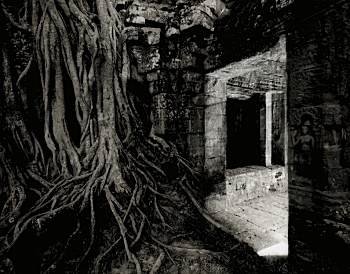 Michael Roulier
______________________________________
White Mytholdogy
Metaphor in the Text of Philosophy
Jacques Derrida
translated by F C T Moore
New Literary History Vol. 6, No. 1 (Autumn 1974)
Philosophy ... and from philosophy, rhetoric. From a book - roughly and more or less a book - to create a flower, and to create it here, to bring it forth, to mount it, rather - to let it mount and find its dawning (and it turns aside as though of itself, revoluted, some grave flower). Following the reckoning of a lapidary, we learn to cultivate patience. ...
Meaphor in the text of philosophy. We might be confident of understanding eveh word of this phrase; we might hasten to make out a figure (or to write it in) in the volume capable of philosophy; we might set ourselves to deal with a specific question: is there meaphor in the text of philosophy? in what form? to what extent? is it necessary or incidental? and so on. Our confidence is quickly lost .....
liberated from JSTOR here
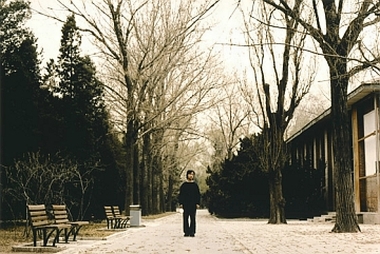 Morse Code 10
Liang Yue via Asian Photography Blog
______________________________________
Praise to the emptiness that blanks out existence. Existence:
This place made from our love for that emptiness!
Yet somehow comes emptiness,
this existence goes.
Praise to that happening, over and over!
For years I pulled my own existence out of emptiness.
Then one swoop, one swing of the arm,
that work is over.
Free of who I was, free of presence, free of dangerous fear, hope,
free of mountainous wanting.
The here-and-now mountain is a tiny piece of a piece of straw
blown off into emptiness.
These words I'm saying so much begin to lose meaning:
Existence, emptiness, mountain, straw:
Words and what they try to say swept
out the window, down the slant of the roof.
The Essential Rumi, translations by Coleman Barks with John Moyne
Saratoga Springs' Rumi Festival
______________________________________
 The Astronomer by Candlelight
detail
Gerrit Dou
1613 - 1675
______________________________________
Spanking New
Critiphoria
February 2008
the terrific new journal
Critiphoria
This interpenetrative space serves as a repository for theoretical and imaginative explorations, as a forum for contemporary cultural concerns, and as a springboard for developing innovative pedagogical tools. .....................................................................
Two more thoughts about deixis [PDF]
Rachel Blau Duplessis Critiphoria
Why can the term deictic mean both the shifter and the pointer? Why can it be both situational and static, contextual and absolute? It must be--because only then will the full sociality of the deictic be acknowledged. Without the strange doubleness of deixis, one is left with an inadequate theory of language. Pointing needs to be accompanied by a sense of sociality, of the transaction, while speaking and understanding require abilities to decode and appreciate contexts.
______________________________________
Failing To Go Under
Stephen Mitchelmore reflects on the writing of Thomas Bernhard
The problem is, what goes on in our heads is also literature, in the sense that consciousness is already distance. Any privileging of inside or outside means a fundamental distortion. It means there is no simple access through writing to what we want to write about. ...The so-called self-reflexive novel is more likely to get closer to the truth than those effacing the conceit. This is why dominant forms of fiction, and the journalistic definition of literature’s relation to the world, needs to be set aside in favour of a mediation between the world and the writer; an infinite mediation. Like Bernhard’s.(...)
Before death, Bernhard achieved full expression because he wrote out of failure to go under. He understood the dangers of art for humanity, and showed respect for the limits of the imagination. Ironically (again), in accepting the limits, he transcended them: partly through the invention of a literary conceit, partly out of lyrical power, partly out of biographical necessity. Such a form of transcendence is why fiction can be more than just information or distraction. It can be where the true self emerges; one’s self with others. Saul Bellow, the American novelist, who shares Bernhard’s waterfall eloquence and complexity, has spoken of the experience of getting it right, and with Bernhardian relish:
“[transcendence is] just a handle. It’s not the real thing. The real thing is an unquenchable need that never stops gnawing at you. And ... you feel that you’re being transcendent in that lousy sense when you are fully expressive. That’s when it happens to you. Then you’re satisfied that you’ve done the right thing. Otherwise no. Otherwise you fall back on explanations and definitions and boring discourse. You might as well be a social scientist and write that sort of stuff.” ... (more) ______________________________________
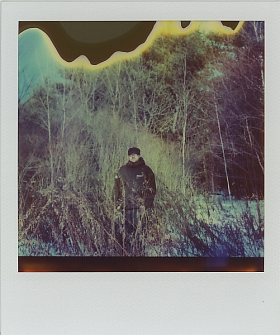 M. Josef Shafer
December 29, 2007
Monkton, VT
passport to trespass
Mikael Kennedy
polaroids via George LeChat
.....................................................................
A Heartfelt, YouTube-Based Wake for Polaroid Instant PhotographyPC Worldplrds.com
Polaroid Photography Collection
 windows
Casa degli Zane, Venice
daguerreotype
John Ruskin
8 February 1819 - 20 January 1900
John Ruskin’s Daguerreotypes of Venice ______________________________________
The Map
Elizabeth Bishop
(February 8, 1911 – October 6, 1979)
Land lies in water; it is shadowed green.
Shadows, or are they shallows, at its edges
showing the line of long sea-weeded ledges
where weeds hang to the simple blue from green.
Or does the land lean down to lift the sea from under,
drawing it unperturbed around itself?
Along the fine tan sandy shelf
is the land tugging at the sea from under?
The shadow of Newfoundland lies flat and still.
Labrador's yellow, where the moony Eskimo
has oiled it. We can stroke these lovely bays,
under a glass as if they were expected to blossom,
or as if to provide a clean cage for invisible fish.
The names of seashore towns run out to sea,
the names of cities cross the neighboring mountains
-the printer here experiencing the same excitement
as when emotion too far exceeds its cause.
These peninsulas take the water between thumb and finger
like women feeling for the smoothness of yard-goods.
Mapped waters are more quiet than the land is,
lending the land their waves' own conformation:
and Norway's hare runs south in agitation,
profiles investigate the sea, where land is.
Are they assigned, or can the countries pick their colors?
-What suits the character or the native waters best.
Topography displays no favorites; North's as near as West.
More delicate than the historians' are the map-makers' colors.
Poems
______________________________________
 A Courtyard at Abbeyville
John Ruskin
1858 The Victorian Web
______________________________________
Recovery Project
Keith Newton on Robert Duncan. The Opening of the Field. Grove Press, 1960
... as Duncan writes elsewhere in “The Truth and Life of Myth,” “Focusing in on the process itself as the field of the poem, the jarring discord must enter the composition,” and this “discord,” this “disturbance,” effects not only the process of the poem’s making but also the very nature of language, as its deformations evoke the falsenesses, fragmentations, and desolations of history:
. . . only a part of the word in- jerrd.
The Thundermakers descend,
damerging a nuv. A nerb.
The present dented of the U
nighted stayd. States. The heavy clod?
Cloud. Invades the brain. What
if lilacs last in this dooryard bloomd?
Discord enters every aspect of life, which carries the seed of its own end within itself, as death is part of the natural order. But the final movement of the poem, “Oh yes! Bless the footfall where / step by step . . . ,” returns to the inception of the poem, reaffirmed by the ecstatic language and inspiring a new way of seeing: “the catalyst force that renders clear / the days of a life from the surrounding medium!”
Written almost fifty years ago, not long after the devastations of the first half of the century and in the shadow of those to come, The Opening of the Field remains one of our most moving attempts to restore, in a world left spiritually barren, some sense of “the human greenness.” There is a sense throughout the book that an unanswerable question lies at its heart: to what purpose, to what end, does the poetry direct its energies? To “the boundaries of the field,” where the mind stops, where language stops, where our stories end? Yet what we find from the beginning of the book is that thought itself is a restorative process, that even as it is directed toward its own boundaries, it is guided by an instinct to create. “In the field of the poem,” Duncan writes in “The Propositions,” “the unexpected / must come.”... (more)via Al Filreis
Octopus Magazine #09______________________________________
Kafka
Toward a Minor Literature
Gilles Deleuze and Felix Guattari
Translation by Dana Polan
download link
Foreword
The Kafka Effect
Reda Bensmai'a
Translated by Terry Cochran
Writing is born from and deals with the acknowledged doubt of an explicit division, in sum, of the impossibility of one's own place. It articulates an act that is constantly a beginning: the subject is never authorized by a place, it could never install itself in an inalterable cogito, it remains a stranger to itself and forever deprived of an ontological ground, and therefore it always comes up short or is in excess, always the debtor of a death, indebted with respect to the disappearance of a genealogical and territorial "substance," linked to a name that cannot be owned.
— Michel de Certeau, L'Ecriture de ITiistoire In December 1934, the Jüdische Rundschau published an important text on Kafka by Walter Benjamin, in which we can read these decisive words: "There are two ways to miss the point of Kafka's works. One is to interpret them naturally, the other is the supernatural interpretation. Both the psychoanalytic and the theological interpretations equally miss the essential points."1 In 1974, when Gilles Deleuze and Félix Guattari devoted a book to Kafka's work, they took their point of departure from the same principle: one misses the mark in Kafka either by putting him in the nursery—by oedipalizing and relating him to motherfather narratives—or by trying to limit him to theological-metaphysical speculation to the detriment of all the political, ethical, and ideological dimensions that run through his work and give it a special status in the history of literature.
______________________________________
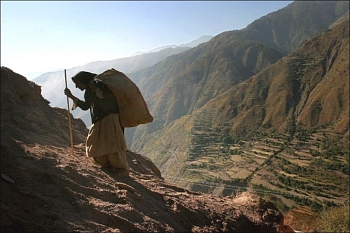 Ghanool
Pakistan
Tomas Munita
Chilean photographer
______________________________________
An Actor Prepares
Jordan Crandall
ctheory
Is it possible to construct a network of interpretation that is nonreductive? What would it be called?
Many years ago, Walter Benjamin called for a criticism that could function like advertising, affecting the reader with intensive, visceral projections that would circumvent any form of contemplation. He advocated for intensities that, like a "burst of energy," affect the very life of the subject.[32] Yet this is now precisely the aim of contemporary power. Are we then to play the same game? On the same stage? With the same roles? ... (more) ______________________________________
Shock Doctrine
Naomi Klein
download link
______________________________________
Oath Betrayed
Torture, Medical Complicity, and the War on Terror
Steven Miles
Review by J. Jeremy Wisnewski, Ph.D.
Picture this: a prisoner is being suspended, arms tied behind his back, from a ceiling beam. He is being asked very difficult questions, some of which he seems not to understand. There is blood dripping from his nose. He is sweating profusely, and he is muttering what appears to be total nonsense. He has not eaten, or slept, for several days. He has been subject to random beatings. His situation seems hopeless.
But then: One of his interrogators motions for another man to come into the room. This man has a stethoscope and a first aid kit. He begins to listen to the prisoner’s heart. He takes his blood pressure. He flashes a small light into the prisoner’s eyes and looks at them closely. His appearance is grim as he turns to the interrogator. There is a moment of hope. “He can continue,” he says. And with that, the beatings begin again.... (more)via 3quarksdaily
______________________________________
 View of Bologna John Ruskin Ruskin at Project Gutenberg
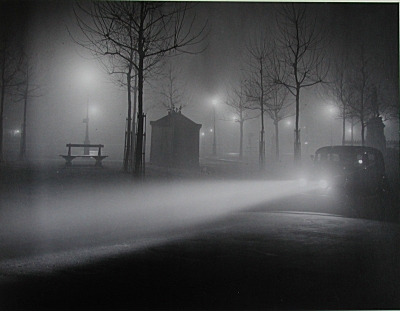 Avenue de l’Observatoire
Brassa?
1934
______________________________________
Hallucinations of Invisibility
From Silence to Delirium
Ted Hiebert
ctheory
As the quest for understanding is revealed as a constructed improvement in the wrong direction, urged on by the currents of social and cultural automata -- the undercurrent reveals a fantasmatic inversion of consciousness itself, as hallucination: the ultimate simulacrum of experience.
We are no longer in the process of disappearing. Rather, we have already disappeared. Everywhere we look for signs, not that we are still here, but that our disappearance was not inevitable -- that it 'could have been' different -- as though if we had somewhere made a mistake we could live with the consequences. Yet if such could ever have been the case there is no trace of it left. What we encounter is not an acceleration towards disappearance but only the realization that we never were. It is not our disappearance that was evitable -- but only our appearance in the first place. (...)
And so we come full circle from where we began. It is no longer us asking the universe for the meaning of life, but the universe who quietly asks us. With a smile, but without irony, we reply simply that we have forgotten.... (more)
Ted Hiebert
artist portfolio & website
______________________________________
Writing Light
Lauren Berlant
...today I’m rereading Eve Sedgwick’s “Paranoid Reading” and “White Glasses” essays, the former of which I find full of contradiction, confusion, and bad self-tracking and yet which I treasure for what it wills to hold out when it replaces “depressive position” with “reparative reading” on behalf of what it only half believes in, partialized readings to create luminous part-objects or potentialities for gathering up qualia, intimate and associative knowledge. It is trying to convince itself that her anger and paranoia will not be the whole story, that they can be interrupted by theory, an orientation toward an affective tendency to appreciate disorienting juxtapositions, mistakes, tenderness, and sweetness. Ideally there would be no compensations, one could just appreciate what’s now. But that’s not the plot of the thing, that’s not the energy of repair.(...)
What lightens me most about Sedgwick is the need to connect, “the bitterness of not doing so”, and the need to make theory give permission to notice the cracks and stick one’s finger in, to be irritating and inconvenient amidst tough-minded beauty and style.... (more)
Supervalent Thought
On attachment, detaching, and ordinary life. ______________________________________
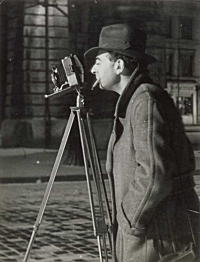 Brassa?
(Gyula Hal?sz)
1899-1984 1 2
______________________________________
Pores
An avant-gardist journal of poetics research
Contributors to Pores 4 were invited to respond to the following questions:
How and why do the ways of reading poetry in the UK that are most publicly visible still exclude work that is aesthetically and linguistically radical? What is the history of these models of reading poetry, and what is their relationship to marketing? What are the key sites of influence and how do they work (as cultural practices and as forms of power)? Why have recent moves, for example in Poetry Review, to give some recognition to the range of British poetries aroused such hostile responses? What is at stake? What are the possibilities for real change? What types of writing and publishing are offering alternative economies of reading to those that postmodern capitalism benefits from? ... (more)
______________________________________
A Conversation with Jorge Luis Borges (1984)
newly translated by Jennifer Acker
... now that I have committed the indecency of turning eighty-five, I confirm without melancholy that my memory is full of verses and full of books, and I can’t see past the year 1955—I lost my reader’s vision—but if I think about my past life, I think of course about friends, loves also, but I think most of all about books. My memory is full of quotes in many languages, and I think that, returning to philosophy, that we are not enriched by its solutions, as these solutions are doubtful, they are arbitrary, and philosophy does enrich us by demonstrating that the world is more mysterious than we thought. That is, what philosophy offers us isn’t a system. It’s not like someone stated a concrete and transparent piece of knowledge, it’s a series of doubts, and the study of these doubts is a pleasure. The study of philosophy can be very pleasant…(...)
If you read something in a diary, you read it with an eye toward obscurity, if you read it in a book, you read it with an eye toward remembering it. If the author is famous you go along with more respect, but the text could be the same, it could be equally valid or equally fallible. I don’t believe that definitive books exist. Furthermore, perhaps you have to see that each generation rewrites the great old books, with its own dialect and footprint.
We’re going to suppose that there are ten or twelve plots for a story, each one has to tell itself in its own way, with slight variations that are, of course, precious. Supposing that everything has already been said is an error.
Moreover, these books have been enriched by generations of readers. Without a doubt Alonso Quijano is more complex now than when Cervantes imagined him, because Alonso Quijano has been enriched, we say, by [Miguel de] Unamuno. Without a doubt Hamlet is more complex now than when Shakespeare originated him; [Hamlet] has been enriched by Coleridge, by Bradley, by Goethe, by so many people. That is, the books live on posthumously. Each time that anyone reads them, the text changes, even if slightly, and the fact of being read with respect makes us see the riches in them ignored by the author. Perhaps a good book never corresponds with everything the author set out to do.... (more)
Habitus
international journal of Diaspora literature and culture. via Three Percent
______________________________________
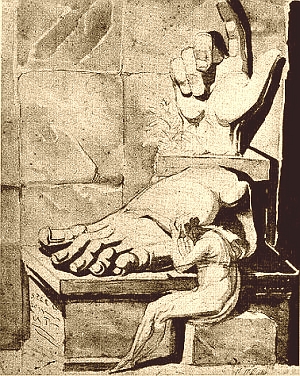 The Artist Moved
by the Grandeur of Ancient Ruins
John Henry Fuseli
7 February 1741 - 16 April 1825
______________________________________
"When I knead the lump
of air, our nourishment, it
is leavened by the letters'
shimmer from the
lunatic-open pore"
(Paul Celan, trans. by Pierre Joris)
Statement for Pores
Rachel Blau DuPlessis
Pores: Issue two - Writing : Art : Forms of Politics
.... what I want to say here is: We have not mourned the failure of modernity enough. The failure to-date.
We have not mourned and comprehended (taken the knowledge inside us) because its failures are pocky, pebbled, irregular (unevenly developed). In our world sector or cadre (defined here, in a friendly way, as made up of people who have enough education, equipment, and access to spearhead on-line journals) we have the more developed gains of modernity, although unequally distributed even inside our sector. Class, race, ethnicity, region, gender, religious culture are some of the filters that bar or inflect the dissemination of the benefits of modernity. But we have not mourned because we are dazzled by the baubles modernity has given to us.(...)
We are not adequately desperate because we were thinking that this unrolling crisis is not about us: globalization, not about us. Possibility of nuclear war, not about us. Our standard of living, not about us. The militant claims to impose fundamentalist religious laws, not about us. Hence our consciousness was pallid and apolitical; this has been going on for years now. We are still living in a form of amnesia and obliviousness. We are not enraged enough about injustice, about the lacks and losses of others, because we don't see these are part of us.... (more)
______________________________________
Taking Sides: Jacques Ranci?re and Agonistic Literature
Hector Kollias
...discusses Jacques Ranci?re's theory of literature as centred on an agonistic concept of literature, where literature is seen as a ‘positive contradiction’. This positive contradiction arises from what Ranci?re sees as literature's origins in the ‘errant letter’, which is conceived as an intrinsically democratic principle that, for Ranci?re, also results in the tendency of literature to incarnate the word and to propose an extra-textual truth which would signal the end of literature as democratic errancy. Asking whether it is possible to identify Ranci?re as ‘taking sides’ in what he sets up as a struggle, the article analyses three examples of Ranci?re's engagement with literary texts (Balzac, Mallarmé, and Proust) in which he demonstrates the necessity for literature to maintain its constitutive contradiction, resulting in a conception of literature as an agonistic field and as a self-critical mode of writing.
.....................................................................
Postcolonial Melancholia
Eli Sorensen
Melancholia follows as a consequence of what Seshadri-Crooks sees as the danger of postcolonial studies, being institutionalized academically, gaining power as the authoritative, critical position, or, the position of the U¨ ber-Ich—one that definitively eliminates the illusion of identifying an ‘authentic’ margin, however much it flagellates itself critically, that is, somewhat schizophrenically ‘revenges’ itself on its deceitful, distrustful object, the objectless object, which keeps resurrecting itself as otherness, or, as the literary. The literary thus, as I have argued, can be seen as representing an important problematic in postcolonial studies, registering the dialectic of institutional power and excessive self-critique as a process of legitimizing the loss of a margin. It represents a risk, transgressing the discursive boundaries, but also a potential to move beyond the cul-de-sac of cultural incommensurability.... (more) .....................................................................
Translation and the Lipogram
Kate Briggs
...explores the affinity between translation and the lipogram with reference to Georges Perec's La Disparition, where the prohibition of the letter e initiates a peculiarly inventive kind of writing. Peculiarly inventive, because the effects generated by writing without a given letter of the alphabet, or by writing a given text again in another, altogether different, language, are essentially unprogrammable: we do not know what is going to happen.... (more)
.....................................................................
Paragraph
modern critical theory.
______________________________________
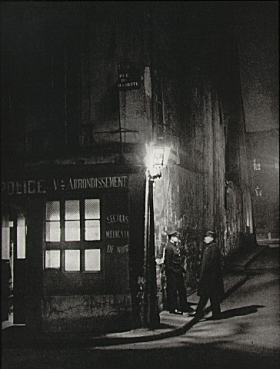 police station
Brassa?
1933
______________________________________
The machine gun of capitalism
Dead soldiers, peak oil and mind-boggling profits; praise Jesus, the machine's still working
Mark Morford
...somewhere in between, the nation's overall health and well-being are sacrificed like dazed lambs to an ignorant god, with our government offering up only the most meager, desultory efforts to keep it functional so as to not induce all-out fire-and-pitchfork revolt.
Is that too simplistic? Too reductive? Not even close. Hell, you can distill it down even further. For if you understand, as most sentient creatures on the planet now do, that this "war" is merely a particularly bloody chunk of a particularly brutal, fraudulent national energy policy spearheaded by Dick Cheney and beloved by Saudi Arabia and Halliburton and most of Texas, then it is no stretch at all to say that we are sending American kids to their deaths exactly so Exxon can continue to make $3 billion in a single month (or: $100 million per day, $4 million per hour, or more than $1,000 every. Single. Second).
Or how about this for dark math: $40 billion for the year, 4,000 dead U.S. soldiers ... that's a cool $10 million in pure profit for every American soldier BushCo has thrown to the wolves of petroleum, just for 2007 alone. Even if you factor in the 20,000 wounded, paralyzed and brain damaged U.S. soldiers — not to mention the record number of military suicides — on a body-by-body basis, you've still got yourself one hell of a sweet profit margin. See Dick Cheney's vile, crooked little grin? Now you know where it comes from.... (more) ______________________________________
Typography: Mimesis, Philosophy, Politics
Philippe Lacoue-Labarthe
Jacques Derrida (Introduction), Christopher Fynsk (Translator)
download here ______________________________________
 Balancing
detail
John Hooper
1926 - 2006
National Arts Centre in Ottawa
photo - mw
______________________________________
If Descartes were alive today he would probably say, ‘I think I can hear a message, as I see it coming, hence I am'.
Exiled Writing, Translated Knowledge: Andrei Codrescu’s Inroads
Camelia Elias
This essay addresses the way in which knowledge about a culture as expressed in fiction and poetry is translated from one discourse (literary and academic) into another (media appearances) and investigates under what conditions the demand of writing becomes the demand of explaining.
The Atlantic Community
Transatlantic Perspectives on America
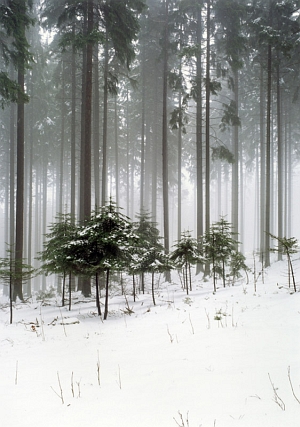 Dancing
Jitka Hanzlov? 1 2 3 4
______________________________________
What makes a great portrait?
Jörg Colberg
Conscientious
What makes a good portrait? Could you provide us an example of a portrait that you really like - either from your or someone else's work - and say why the portrait works so well for you?" to publish what we would get back on our blogs, as a collaborative effort to get a little bit closer to understanding the topic. Below is what we got back from those who managed to find the time to write something. Our thanks to everybody who contributed!
Brian Ulrich's contribution
In many respects the photographer is the lead in a crazed power dynamic; the sitter must lend themselves, their time, patience and likeness to the photographer in a relationship that has to have some degree of trust in how the photographer might represent them. The photographer, in some cases knowing more or less about the subject, has a opportunity to describe them in a number of ways. All this often leads to the eternal portrait question: From the sitter, "What do you want me to do?".
It's utterly fantastic to think of the psychological implications of all these goings on in some cases in a 2 minute meeting, in others a 1/2 a second. Certainly there is nothing normal in this act. Which might explain most people's reactions to photography, "You want to take a picture of me....?"... (more)
______________________________________
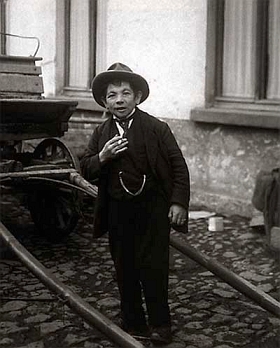 August Sander
1876 – 1964 1 2 3 4
______________________________________
From Al Filreis
The Chinese/American Association for Poetry and Poetics (CAAP) initiated by Marjorie Perloff, Charles Bernstein, and Nie Zhenzhao, was established in January 2008 with its headquarters at Center for Programs in Contemporary Writing (CPCW), University of Pennsylvania, USA.(...)
This is an international academic organization devoted to the study of poetry and poetics, focusing on the scholarship and translation of international poetry, with special emphasis on the study and translation of North American poetry in China and Chinese poetry in North America, but also with a commitment to see North American poetry and Chinese poetry in a global context.(...) CAAP will sponsor academic activities such as scholarly conferences, exchanges of scholars, translation, and publication. All scholars and poets who share the interests of this Association are warmly welcome to join. The email address is caap2008@gmail.com.... (more)
______________________________________
In Old Age
Louis Dudek
February 6th, 1918 - March 22nd, 2001
Writing poetry for an unlettered people,
I have suffered
scorn and neglect, the usual insult,
without comment or complaint
for many years-
but now
in my old age
when I see the young,
in thin puffy feathers, mouths open,
and suffering the same
death and starvation, dying
for mere lack of nurture,
for common comfort,
I rage
I rage
I open my terrible wings, among these black branches
and I rage.
quoted in...
"Still Buming" Brightly
Tony Tremblay on Louis Dudek
Charlotte Hussey reviews Eternal Conversations: Remembering Louis Dudek: A Tribute Anthology
.....................................................................
Most literary writing is either more or less than it appears to be. This book, edited by Omar Pound and Robert Spoo, with its hefty Introduction and many detailed annotations is entitled Letters in Captivity, 1945-1946, but the scope and meaning of the book reach far beyond the two years given and throw much light on the nature of genius, its psychology, sociology, and tragic destiny.
At the same time my review of this book may define and evaluate it, but I know it will also be my last statement on a writer to whom I have been devoted for sixty years, sometimes very critically, and this final statement will to some extent be a revision and a summation. Louis Dudek reviews Ezra and Dorothy Pound, Letters in Captivity, 1945-1946
______________________________________
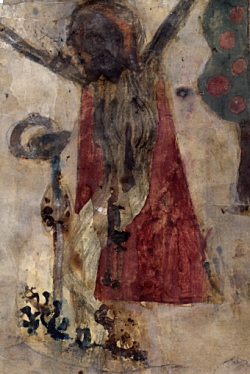 i wish all fields were paper
herbert pfostl's paper graveyard via la main gauche
______________________________________
Mythbusting Canadian Health Care -- Part I
Sara Robinson
2008 is shaping up to be the election year that we finally get to have the Great American Healthcare Debate again. Harry and Louise are back with a vengeance. Conservatives are rumbling around the talk show circuit bellowing about the socialist threat to the (literal) American body politic. And, as usual, Canada is once again getting dragged into the fracas, shoved around by both sides as either an exemplar or a warning -- and, along the way, getting coated with the obfuscating dust of so many willful misconceptions that the actual facts about How Canada Does It are completely lost in the melee.
I'm both a health-care-card-carrying Canadian resident and an uninsured American citizen who regularly sees doctors on both sides of the border. As such, I'm in a unique position to address the pros and cons of both systems first-hand. If we're going to have this conversation, it would be great if we could start out (for once) with actual facts, instead of ideological posturing, wishful thinking, hearsay, and random guessing about how things get done up here.
To that end, here's the first of a two-part series aimed at busting the common myths Americans routinely tell each other about Canadian health care. When the right-wing hysterics drag out these hoary old bogeymen, this time, we need to be armed and ready to blast them into straw. Because, mostly, straw is all they're made of.... (more) via David Neiwert ______________________________________
Canadian Tories cock up their war
Lenin's Tomb
You’d think that the knuckle-draggers and mouth-breathers who presently run the Government of Canada would be able to run the war in Afghanistan. After all, war is what these jokers are all about and Afghanistan is the “good war” in the War on Terror. Well, it warms the cockles of the heart to see that, in fact, sometimes even a PR budget bigger than the budget for reconstruction isn’t enough to cover up corruption and brutality.... (more)
______________________________________
America's Gulag and the Good War
Chris Floyd
The long-running "progressive" stance on America's 21st century imperial adventures can be reduced to this simple dichotomy: Afghan war good, Iraq war bad. And for all progressives who want to be regarded as "serious," the Iraq war is bad because it has distracted us from the real war, the good war, in Afghanistan. This theme has been sounded over and over by the "progressive" candidates throughout the presidential campaign. It is the opinion of a sizable majority of the U.S. population, which has clearly repudiated the Iraq war but still supports the Afghan war.
But a story by Carlotta Gall and CounterPuncher Andy Worthington in the New York Times reminds us most forcefully that the Afghan war is not and has never been some separate entity from the brutal, voracious "War on Terror" machine that has killed a million people in Iraq, spawned a global gulag of torture sites and secret prisons for uncharged captives and kidnap victims, and destroyed the last vestiges of the American republic, replacing it with an authoritarian "Commander-in-Chief State" ruled quite literally by the führerprinzip, where the order of the Leader transcends any law. A poison tree can only bring forth poison fruit -- and the Afghan war is a fruit of the Terror War tree.... (more)
______________________________________
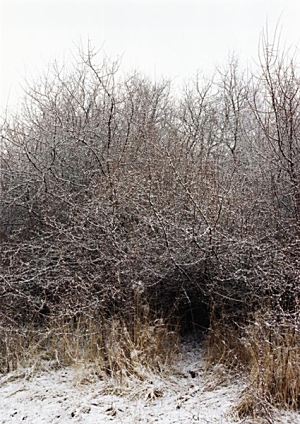 Hide
Jitka Hanzlov?
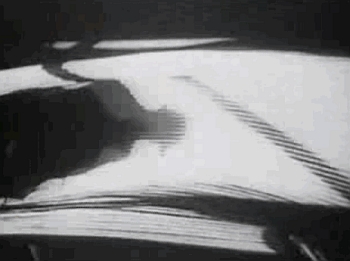 Ballet Mécanique
(1924)
Fernand Leger
cinematography by Man Ray
music by George Antheil
Part 1 Part 2
youtube
______________________________________
The priest Gods in the temple. They move very slowly, faces ravaged with age and disease. Parasitic worms infest their flesh. They are making calculations for the sacred books.
"400,000,000 years ago on this day a grievous thing happened..."
The Electronic Revolution [PDF]
William S. Burroughs
FEEDBACK FROM WATERGATE TO THE GARDEN OF EDEN In the beginning was the word and the word was god and has remained one of the mysteries ever since. The word was God and the word was flesh we are told. In the beginning of what exactly was this beginning word? In the beginning of WRIT- TEN history. It is generally assumed that spoken word came before the written word. I suggest that the spoken word as we know it came after the written word. In the beginning was the word and the word was God and the word was flesh ... human flesh ... In the beginning of WRITING. Animals talk and convey informa- tion but they do not write. They cannot make information available to future gener- ations or to animals outside the range of their communication system. This is the crucial distinction between men and other animals. WRITING. Korzybski, who developed the concept of General Semantics, the meaning of meaning, has pointed out this human distinction and described man as ‘the time binding animal’. He can make information to other men over a length of time through writing. Animals talk. They don’t write. Now a wise old rat may know a lot about traps and poison but he cannot write a text book on DEATH TRAPS IN YOUR WAREHOUSE for the Reader’s Digest with tactics for ganging up on digs and ferrets and taking care of wise guys who stuff steel wool up our holes. It is doubtful if the spoke word would have ever evolved beyond the animal stage without the written word. The written word ist inferential in HUMAN speech. It would not occur to our wise old rat to assemble the young rats and pass his knowledge along in an aural tradition BECAUSE THE WHOLE CONCEPT OF TIME BINDING COULD NOT OCCUR WITHOUT THE WRITTEN WORD. The written word is of course a symbol for something and in the case of hieroglyphic language writing like Egyptian it may be a symbol for itself that is a picture of what it represents. This is not true of an alphabet language like English. The word leg has no pictorial resemblance to a leg. It refers to the SPOKEN word leg. so we may forget that a written word IS AN IMAGE and that written words are images in sequence that is to say MOVING PICTURES.
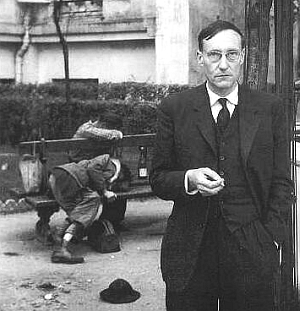 William S. Burroughs
February 5, 1914 - August 2, 1997 William S. Burroughs at UbuWeb Sound
If civilized countries want to return to Druid Hanging Rites in the Sacred Grove or to drink blood with the Aztecs and feed their Gods with blood of human sacrifice, let them see what is on the end of that long newspaper spoon.
-- William S. Burroughs, Testimony Concerning A Sickness
______________________________________
New Horizons in Mathematics as a Philosophical Condition: An Interview with Alain Badiou
Alain Badiou with Tzuchien Tho
TT On the basis of this difference, Ii wonder whether the inconsistent multiple would not be split between two senses of the inconsistent, in your sense and in the sense of the contradictory. Tthe reason why think this is important is because relative to the position of the void in the two systems that you have developed in Being and Event and Logiques des Mondes, there is a sort of stabilization point which employs a strong sense of negation. Iin pure ontology there is a stabilization point in the void and with the question of existence, it is negation that establishes a minimum in relation to the “inexistent”, so in a way, in the most specific local point, there is also a global effect.
AB I perfectly understand your question which finally begins to force me to confess my primordial decision concerning negation or my taking negation as a fundamental principle. (Laughs) Ii exaggerate, but there again, the void, as you say, the void of ontology or the inexistence in appearance or in the world, in these two cases there is the negative or a space where there is something of importance given to the negative. Iit is true, would say yes, but Ii think that it is a consequence, and not a principle. The discussion is uniquely there, whether it is to be a principle or a consequence. The reason why the void is important is because it is the moment where there is a null point of identity. Iit is important solely because the decision taken concerning difference cannot be applied to the void because if difference is always made, in this case, element by element, what do we do with difference of the void where there are no elements? parrhesia a journal of critical philosophy
Restating Sovereignty: On America’s Regaining the Old Sense of the Political [PDF]
riedrich Balke
Friendship, Assymetry, Sacrifice: Bataille and Blanchot [PDF]
Patrick ffrench
Sartre Integrating Ethics and Politics: The Case of Terrorism [PDF]
Marguerite La Caze ______________________________________
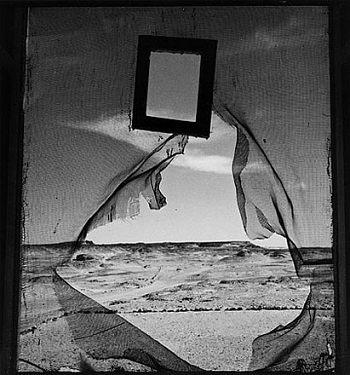 Portrait of Space
near Siwa, Egypt
Lee Miller
1937.
______________________________________
Big projects either fly in my house, or skulk away defeat’d, and the fourfold Lewis may prove a piece of pie to big for the piehole, to put it quickly before the metaphor entirely goes over to the “other side.” On verra. The Ezra Pound lines Kenner prefaces ’s little book with—“Wyndham Lewis, the man who was wrong about everything except the superiority of live mind to dead mind; for which basic verity God bless his holy name.” Which, in a similar “era”—of minds deaden’d by careerist affect and marketing ploy, or shat over by the info-splurge—may be reason enough to read him, “wrong.” John Latta, The Apes of God Notes
______________________________________
Vienna 1900
Blog journal coffeehouse & other resources for the UW Germanics Winter Quarter '08 Vienna 1900 course
currently discussing Hofmannsthal and Musil
thanks to Dispatches from Zembla ______________________________________
After all, when you come right down to it, how many people speak the same language even when they speak the same language?
- Russell Hoban, The Lion of Boaz-Jachin and Jachin-Boaz
______________________________________
Havmophunic Transolutions
a group blog interested in performing homophonic translations for poetickal reasons.
______________________________________
Translations on the Market
Lawrence Venuti
words without borders
The main problem is that long-standing practices reveal a conceptual na?veté, a limited understanding of translation, of the cultural issues that any translation project must confront and somehow resolve if it is to be successful both critically and commercially. Hence I want to suggest that, where translation is concerned, these practices need to be rethought, if not simply abandoned, and replaced by a more savvy approach that is truly concerned with cultural as well as commercial factors. Otherwise Anglophone publishers—and no doubt publishers in other languages as well—will remain complicit in our present predicament: the absence of what I shall call a translation culture, that is to say, a culture that can sustain the study and practice of translation, that can foster a sophisticated and appreciative discourse about translation in its many aspects, and that can create an informed readership to support and encourage the publication of translated texts.... (more)via Out of the Woods Now
______________________________________
$urplus
Spinoza, Lacan
A. Kiarina Kordela
If, unlike the “Neo-Spinozists” and several “Neo-Lacanians,” we want to remain within representation with its (double) failure and its self-referentiality as its sole nonrepresentable effects, and, if we also want to maintain the structural homology between economic and semantic exchange, how can we formulate a theory of ethics as also the ground for political action? Full text download available here______________________________________
 War(memorial) and Peace(tower)
with aleatoric glyphs
Ottawa
photo - mw ______________________________________
Spectres Of Marx
Jacques Derrida
the state of the debt, the work of mourning, and the new international
translated by Peggy Kamuf
available here
cross-x ______________________________________
Potentialities: Collected Essays in Philosophy
Giorgio Agamben
The End Of The Poem [PDF]Studies in Poetics
Giorgio Agamben
Infancy and History: On the Destruction of Experience
Giorgio Agamben
Photography: A Middle-Brow Art
Pierre Bourdieu Remnants of Auschwitz
Giorgio Agamben
State of Exception
Giorgio Agamben
all courtesy of Fark Yaralari ______________________________________
More and more I find that life is a series of disappearances followed usually but not always by reappearances; you disappear from your morning self and reappear as your afternoon self; you disappear from feeling good and reappear feeling bad. And people, even face to face and clasped in each other's arms, disappear from each other.
- Russell Hoban, Fremder
______________________________________
A psychotic is someone who just found out what's going on.
- William S. Burroughs
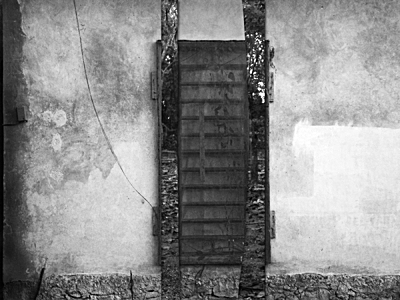 Another Door
Germ?n Herrera more via
______________________________________
Winter Twilight
Georg Trakl
To Max von Esterle
Black skies of metal.
In the evening hunger-mad crows
Blow crosswise in red storms
Over parks sorrowful and sallow.
In the clouds a beam freezes to death;
And before Satan's curses
Those spin within the circle and go
Down sevenfold in number.
In putrefaction sweet and stale
Their beaks mow noiselessly.
Houses threaten from mute nearnesses;
Brightness in the theater hall.
Churches, bridges, and hospitals
Stand gruesome in the twilight.
Blood-stained linens billow
Sails upon the canal.
 Hellebore for Georg Trakl
R.B. Kitaj Georg Trakl
February 3, 1887 - November 3, 1914 Index of all literary texts of Georg Trakl
translations by Jim Doss and Werner Schmitt
Winter Walk in A-Minor
Georg Trakl
Red spheres often emerge from branches,
Snowed under softly and black by a long snowfall.
The priest escorts the dead person.
The nights are fulfilled by celebrations of masks.
Then tousled crows glide over the village;
In books fairy tales are written miraculously.
At the window an old man's hair flutters.
Demons go through the ill soul.
The well freezes in the courtyard. Decayed stairs fall
In the darkness and a wind blows
Through old shafts which are buried.
The palate tastes the frost's strong spices.
______________________________________
 photo by Carl Van Vechten
"As long as the outside does not put a value on you it remains outside but when it does put a value on you then it gets inside or rather if the outside puts a value on you then all your inside gets to be outside."
- Gertrude Stein
(February 3, 1874 - July 27, 1946)
Gertrude Stein Links Duane Simolke ______________________________________
Thatching: A Kodak Film
Two brown men on a yellow round rick, thatching; in the background, a row of green elms; above, a windhover poised in mid-air; perpendicular silver streaks of rain; bright sunlight, and a rainbow encircling all. It was as simple as a diagram. One could have cut out the picture with a pair of scissors. I looked with a cold detached eye, for all the world as if the thatchers had no bellies nor immortal souls, as if the trees were timber and not vibrant vegetable life; I forgot that the motionless windhover contained a wonderful and complex anatomy, rapidly throbbing all the while, and that the sky was only a painted ceiling.
But this simplification of the universe was such a relief. It was nice for once in a way not to be teased by its beauty or over-stimulated by its wonder. I merely received the picture like a photographic plate.
W. N. P. Barbellion
______________________________________
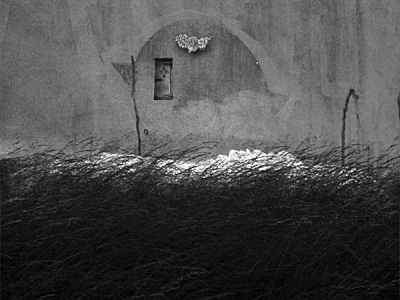 Erks
Germ?n Herrera
______________________________________
The Year of Living Dangerously
Part One of Two
Manuel Valenzuela
Can you sense the growing momentum of militarism and imperialism rampaging across the nation, and the globe, leaving nothing but hatred and animosity in its wake? Can you sense that imperialism and empire abroad and freedom and democracy at home are mutually exclusive, that to attain the former the latter must be sacrificed, and that inevitably the people must, for imperialism to function, be immersed in tyranny? Do you realize that we are one major shock, one major event away from catapulting our lives into the headwaters of an altogether different America?(...)
it has been our passivity and acquiescence, bred of comfort, distraction and the erosion of critical thinking, that has facilitated our decent into authoritarian and corporatist waters. It has been our indifference and our “can’t happen here” mentality that is inevitably guaranteeing that it does, in fact, “happen here.” It is our inexperience with tyranny at home and our lack of exposure to authoritarian tendencies such as surveillance, secret police, torture, spying and disappearances, prevalent in many American supported states, encouraged by our government, though until recently non-existent here, that subjects us to a methodical assault by Machiavellian ideologies.... (more) ______________________________________
In Winter
Georg Trakl
The acre shines white and cold.
The sky is lonely and immense.
Jackdaws circle over the pond
And hunters climb down from the forest.
A silence dwells in black treetops.
Firelight flits from the huts.
Sometimes a sleigh rings far away
And slowly the gray moon rises.
A deer bleeds to death softly at the field's edge
And ravens splash in bloody gutters.
The reeds tremble yellow and upraised.
Frost, smoke, a step in the empty grove.
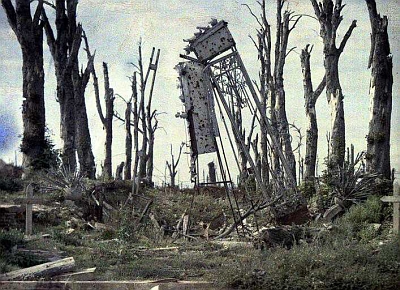 World war one color photos
______________________________________
Three quarks for Muster Mark!
Sure he hasn't got much of a bark
And sure any he has it's all beside the mark.
But O, Wreneagle Almighty, wouldn't un be a sky of a lark
To see that old buzzard whooping about for uns shirt in the dark
And he hunting round for uns speckled trousers around by Palmer-
stown Park?
Hohohoho, moulty Mark!
You're the rummest old rooster ever flopped out of a Noah's ark
And you think you're cock of the wark.
Fowls, up! Tristy's the spry young spark
That'll tread her and wed her and bed her and red her
Without ever winking the tail of a feather
And that's how that chap's going to make his money and mark!
Overhoved, shrillgleescreaming. That song sang seaswans. The winging ones. Seahawk, seagull, curlew and plover, kestrel and capercallzie. All the birds of the sea they trolled out rightbold when they smacked the big kuss of Trustan with Usolde. Finnegans Wake 2.4.383
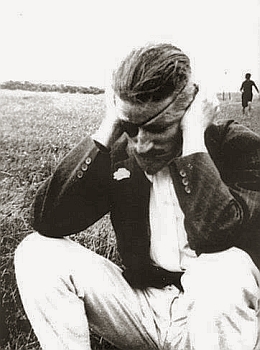 James Joyce
February 2, 1882 – January 13, 1941
after another eye operation
1922
(Photo from the Rosenbach Museum and Library) The Brazen Head
A James Joyce Public House
The Modern Word
James Joyce Portal
Jorn Barger
.....................................................................
Countlessness of livestories have netherfallen by this plage, flick as flowflakes, litters from aloft, like a waast wizzard all of whirlworlds. Now are all tombed to the mound, isges to isges, erde from erde.
- Finnegans Wake 1.1.17
______________________________________
Inside God's Toolbox
Jon Adams reviews William J. Jackson, Heaven's Fractal Net: Retrieving Lost Visions in the Humanities
electronic book review
The Mandelbrot Set has been called "God's thumbprint." The thumbprint is a good point of comparison, for while every thumbprint looks different, every thumbprint also looks like a thumbprint. While such fractals never repeat themselves, nor do they ever (in any meaningful sense of the word) change. So if the Mandelbrot Set is the thumbprint of God because it possesses a complexity that never precisely repeats, then it may also be the map of hell, for it possesses a complexity that never advances, no matter how hard you push. Everywhere is different; everywhere is the same. We always know where we're going; it's just that we'll never quite get there. They are the visual equivalent of a Zeno paradox - never quite finishing, but not really changing either.
One of the curious things about the Mandelbrot Set is that while its appearance awaited the advent of the computer age, seeing it for the first time everyone felt a strange sense of familiarity, and this familiarity is where William Jackson begins Heaven's Fractal Net. Jackson thinks that the fractal has been intuitively known to humanity for millennia, and that evidence for this implicit understanding can be found in most civilisations in all places and at all times dating back to the origins of art and culture.... (more)
______________________________________
Best wishes go out to Stephen Mitchelmore (This space) who is recovering from a nasty accident.
Thanks to Mark Thwaite (ReadySteadyBlog) for the heads-up.
______________________________________
Audio Interview with Antiquarian Bookseller Patrick McGahern by Nigel Beale.
I talked with Patrick recently in his store about the book trade: how it was, how it is, how it will be. About idiosyncrasies, obsessions, buses and booksellers playing psychiatrist and priest; about ILAB and AbeBooks, and finally, about simply doing the work.
Patrick McGahern Booksa favorite of mine in the Glebe neighbourhood of Ottawa
______________________________________
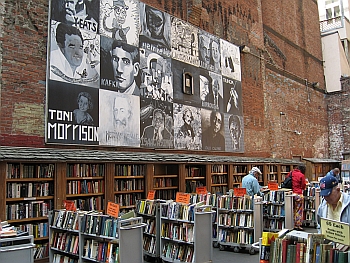 Brattle Books, Boston
Nigel Beale’s Book Shop Photos
flickr
______________________________________
The Old Haunts: A Guided Tour
Philip Metres
jacket
I hate to be the head
People have to look through
*
A benighted daydream
A Venice in ice
*
So let’s begin:
This is the Winter Palace
*
Six selves sleeping on the Neva
Their dreams the frames
*
Of the History of Western Art:
Two thousand eyes open
*
Have you been sleeping?
I can’t catch up my body clock
... (more)
______________________________________
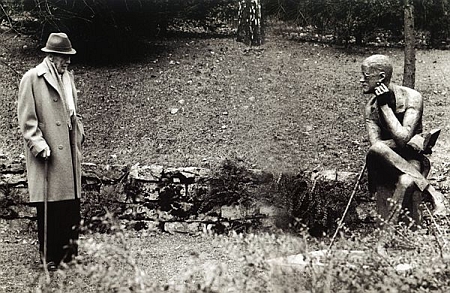 Pound visits Joyce's grave
Zurich, 1967
photo found here
You is feeling like you was lost in the bush, boy? You says: It is a puling sample jungle of woods. You most shouts out: Bethicket me for a stump of a beech if I have the poultriest no- tions what the farest he all means. Gee up, girly! The quad gos- pellers may own the targum but any of the Zingari shoolerim may pick a peck of kindlings yet from the sack of auld hensyne.
Finnegans Wake 1.5.112
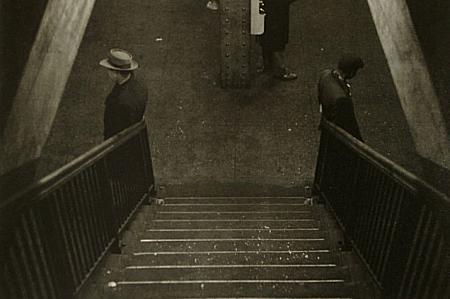 Roy DeCarava 1 2
______________________________________
Silences: The Autobiography Of Loss
Eileen R. Tabios
.....................................................................
Silences reviewed by Thomas Fink
The Oedipal pull of the poet’s tropes is in some sense “ridiculous,” too, and the strain it evinces dramatizes the difficulties of displacing social hierarchies with a new, better configuration. But perhaps the most important assertion, not far from the end of the series, involves precise political resonances: ”I am Babaylan. I have never been mastered by three centuries of invading colonizers or their religion” (70). The spirit of Filipina women has survived colonizations, and the spell-maker invites others to experience the restorative energy of its voice and scent: “Breathe in the sampaguita breeze known by warrior cultures as jasmine. Inhale my breath// into your veins to linger there, healing your ears now to hear me sing. . . .” The “autobiography of loss” moves from “silences” to articulation, and it also includes the autobiography of future gain.... (more)
Otoliths - February, 2008
______________________________________
Oppression
Langston Hughes
Now dreams
Are not available
To the dreamers,
Nor songs
To the singers.
In some lands
Dark night
And cold steel
Prevail
But the dream
Will come back,
And the song
Break
Its jail.
 Langston Hughes
February 1, 1902 - May 22, 1967
photo by Gordon Parks, Chicago 1941
poems Featured Author: Langston Hughes
With News and Reviews From the Archives of The New York Times
______________________________________
"To rule forever," continues the Chinaman, later, "it is necessary only to create, among the people one would rule, what we call...Bad History. Nothing will produce Bad History more directly nor brutally, than drawing a Line, in particular a Right Line, the very Shape of Contempt, through the midst of a People,-- to create thus a Distinction betwixt 'em,-- 'tis the first stroke.-- All else will follow as if predestin'd, unto War and Devastation."
- Pynchon, Mason & Dixon
______________________________________
 Roy DeCarava
______________________________________
Image Music Text
Roland Barthes
translated
by Stephen Heath
full text download
Rhetoric of the Image
According to an ancient etymology, the word image should be linked to the root imitari. Thus we find ourselves immediately at the heart of the most important problem facing the semiology of images: can analogical representation (the 'copy') produce true systems of signs and not merely simple agglutinations of symbols? Is it possible to conceive of an analogical 'code' (as opposed to a digital one)? We know that linguists refuse the status of language to all communication by analogy - from the 'language' of bees to the 'language' of gesture - the moment such communications are not doubly articulated, are not founded on a combinatory system of digital units as phonemes are. Nor are linguists the only ones to be suspicious as to the linguistic nature of the image; general opinion too has a vague conception of the image as an area of resistance to meaning - this in the name of a certain mythical idea of Life: the image is re-presentation, which is to say ultimately resurrection, and, as we know, the intelligible is reputed antipathetic to lived experience. Thus from both sides the image is felt to be weak in respect of meaning: there are those who think that the image is an extremely rudimentary system in comparison with language and those who think that signification cannot exhaust the image's ineffable richness. Now even - and above all if- the image is in a certain manner the limit of meaning, it permits the consideration of a veritable ontology of the process of signification. How does meaning get into the image? Where does it end? And if it ends, what is there beyond! ______________________________________
 dayroom
State Lunatic Asylum
Milledgeville, Baldwin County, Georgia
ca. 1894
Vanishing Georgia
18,000 photographs
Georgia Division of Archives and History
|

















































